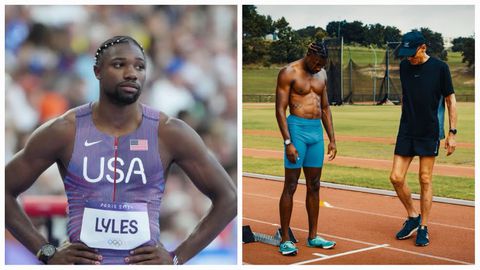Olympic champion Noah Lyles during a tarining session with Ralph Mann
Ralph Mann helped Olympic champion Noah Lyles work on his poor starts in races, coming of the blocks before the sprinter went on to become a global icon.
Olympic champion Noah Lyles is mourning the loss of Ralph Mann, the legendary Olympian and biomechanist, whose expertise played a pivotal role in the sprinter’s ascent to greatness on the track.
Mann passed away on January 2, 2025, at the age of 75, following a battle with pancreatic cancer, his death leaving the athletics community in deep grief.
Mann’s son, Randal Mann, broke the news in an emotional Instagram post.
“With great sadness, we announce the death of our father, Ralph Vernon Mann, who passed away on January 2 from pancreatic cancer, at the age of 75. A brief list will not do him justice,” read the post partly.
Lyles, who shared a close relationship with Mann, took to social media to express his sorrow and gratitude.
“For those who don’t know who this is, this is Ralph Mann! An Olympian and former world record holder,” wrote Lyles in an Instagram post.
“But that’s not why I know him. I know Ralph because he is the crazy scientist that helped me and my coach turn me into the athlete I am today. He brought a new way of thinking to my starting blocks that helped me to become a great 60m runner and 100m Olympic Champion,” he went on to add before expressing his gratitude and sorrow for the loss.
“I will forever be grateful for the love and support he showed me and for sharing his craft. I will forever remember you. RIP Ralph and THANK YOU.”
Lyles, renowned for his blistering finishing speed, struggled in the early phases of races, particularly during his start. His hips were positioned too far back in the set position, his foot turnover was slow, and his drive lacked the efficiency needed for elite competition.
‘We had to pay our way to meets’- Track & field power couple open up on tumultous rise to global fame
‘We had to pay our way to meets’- Track & field power couple open up on tumultous rise to global fame
Recognizing this limitation, Lyles turned to Mann, whose groundbreaking biomechanical analysis transformed his performance.
Mann, a biomechanics expert with a PhD, developed advanced software to analyze Lyles’ starting mechanics.
By creating a digital “stickman” model of Lyles’ movements, Mann provided a clear visualization of the optimal positions and movements required for an elite start.
Frame-by-frame analysis revealed key adjustments, including repositioning Lyles’ hips, increasing foot turnover, and reducing ground contact time.
These refinements culminated in Lyles embracing a highly technical approach, even pushing Mann to expand the boundaries of his model.
The results were spectacular. At the 2024 Paris Olympics, Lyles delivered a historic performance, claiming gold in the 100m and bronze in the 200m despite battling COVID-19.
How a 300-page text book and a ‘stickman’ made Noah Lyles Olympic 100m champion
How a 300-page text book and a ‘stickman’ made Noah Lyles Olympic 100m champion
Before his career as a biomechanist, Mann achieved remarkable success as an athlete. He captured silver in the 400-meter hurdles at the 1972 Munich Olympics and set world records in the 440-yard hurdles in 1970 and the 400-meter hurdles in 1972.
In 2015, Mann’s contributions to athletics were recognized with his induction into the USA National Track and Field Hall of Fame.
Beyond his personal achievements, Mann dedicated his life to advancing the science of sprinting, leaving an indelible mark on countless athletes, including Lyles. His pioneering work in biomechanics redefined how elite sprinters approach their craft, cementing his legacy as a visionary in track and field.

Leave a Reply